Title: Prioritizing Athlete Health: Medical Support at the Tokyo 2020 Olympics Marathon and Race Walking Events
As audiences around the globe tuned into the Tokyo 2020 Olympics, attention was drawn not only to the elite athletes but also to the comprehensive medical services established for their protection. Among the most demanding events were the marathon and race walking competitions, where participants faced extreme summer temperatures and challenging distances. Behind every stride, a dedicated medical team worked tirelessly to safeguard competitors’ health on-site. This article explores how athlete medical services played a pivotal role during these critically important events, highlighting innovative protocols and responses that ensured success amid pandemic-related challenges. From immediate care facilities to emergency response strategies, discover how athlete welfare was prioritized during this historic occasion.
Essential Health Support Measures for Marathon and Race Walking Athletes at Tokyo 2020
Throughout the tokyo 2020 Olympics, marathon runners and race walkers encountered distinct challenges necessitating robust medical assistance. Given both severe weather conditions and strenuous physical demands of long-distance racing, organizers implemented essential health support measures crucial for ensuring athlete safety and performance levels. These measures included:
- Round-the-Clock Medical Stations: Strategically located along race routes to provide immediate treatment for injuries or heat-related issues.
- Hydration Points: Equipped with electrolyte-rich drinks to help athletes maintain proper hydration throughout their races.
- Telehealth services: Remote consultations available for athletes seeking advice without needing in-person visits.
- Cooling Areas: Temporary shelters featuring misters and fans aimed at reducing body temperature during heat surges.
The medical team also conducted thorough pre-race evaluations to assess each athleteS health status while developing personalized recovery plans tailored to individual requirements. This holistic approach extended into post-race discussions where athletes received insights on recovery techniques, nutritional guidance, as well as mental wellness resources. below is a summary of key medical services provided:
| Service Offered | Description |
|---|---|
| Preevent Health Evaluations | A comprehensive assessment aimed at identifying potential health risks. |
| dynamically Monitored Care During Events | An ongoing evaluation of athletes’ health throughout competitions. |
| Adequate Post-Race Recovery Guidance | Counseling on rest periods, nutrition intake, and physical rehabilitation practices. |
advancements in Athlete Medical Services: Improving Safety Standards at major Competitions
The Tokyo 2020 Olympics marked a significant advancement in athlete healthcare services by utilizing state-of-the-art technology alongside established protocols designed to enhance safety standards for participants in marathon running and race walking events. Notable innovations included integrating
The emphasis placed by tokyo’s medical staff extended beyond just physical care; mental wellness support was equally prioritized.A dedicated team of sports psychologists was made available throughout all events ensuring emotional resilience remained intact.Moreover,a meticulously crafted emergency response plan encompassed: The experiences gleaned from navigating challenges presented by COVID-19 during these Olympic Games underscored an urgent need for effective athletic healthcare systems—especially evident within marathons/race walks.A primary takeaway emphasizes implementing
Regular mental wellness check-ins addressing psychological strains faced by high-pressure competition participants additionally,the integration of advanced technologies emerged as paramount highlighting real-time data tracking capabilities essential towards managing overall competitor wellbeing.By incorporating
the remarkable achievements witnessed duringTokyo’s Olympic Games showcased not merely exceptional athletic prowess but rather an intricate network supporting participant welfare tailored explicitly towards marathons/races.As competitors navigated unprecedented hurdles posed both due pandemic circumstances & environmental factors—the comprehensive array implemented ensured utmost security & comfort throughout contests.From initial screenings through responsive teams positioned strategically along routes—the dedication exhibited by those involved highlighted just how critical quality healthcare remains within elite sports settings.This commitment serves as inspiration moving forward establishing higher standards concerning future international sporting endeavors emphasizing prioritization surrounding competitor safety/wellbeing whilst celebrating competitive spirit itself.
This multifaceted strategy not only protected competitors through rigorous demands but also set new benchmarks regarding healthcare provisions within international sporting contexts.
Lessons from Tokyo 2020: Guidelines for Future Athletic Medical Preparedness
Enhance collaboration efforts between physicians/coaching staff/athletes tailoring individualized approaches effectively
Establish contingency plans ready-to-execute swiftly upon encountering emergencies occurring amidst competitions.Looking Ahead: The Future Landscape of Athlete healthcare Services

